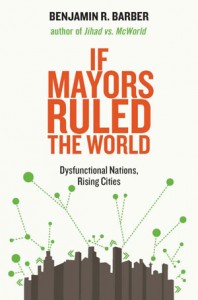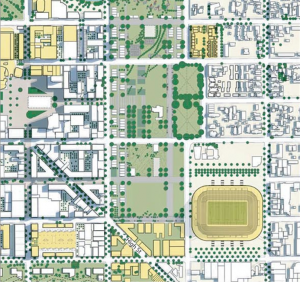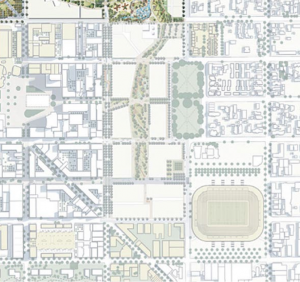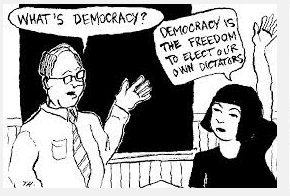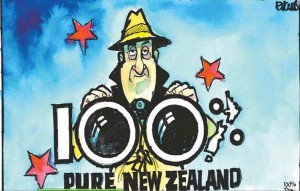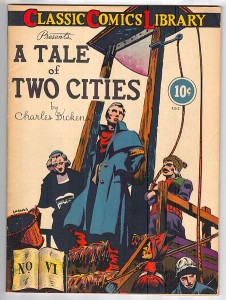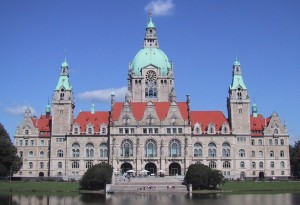
The New Town Hall in Hanover – When local government obviously mattered
No sooner than I clicked the ‘publish’ button for the previous post, along comes a strong echo of almost exactly the same refrain.
This time, Rodney Hide – after complimenting Len Brown on his stewardship of the Super City – spookily echoes Sir Gil Simpson’s call for another option on the local government ballot paper:
It must be disheartening for councillors and mayors to be elected on so few votes. It’s hardly a ringing endorsement. The bulk of us aren’t that interested.
We need a new box to tick on the ballot. One that says “none of the above”. That would enable voters to say, we don’t care, we just want the elected government of the day to appoint the best people to run our city and region.
That’s what happens now for most government-run organisations and operations. We need that option on the ballot for local bodies.
That’s what’s happened with the regional council in Canterbury. It has a top civil servant, a former top judge, an ex-minister, and business people – a qualified and professional leadership team who can get on with the job.
It’s a far better team than one would ever get standing for election. It would seem to me that we should have that option in the rest of the country.
I would vote if I could tick a box that allowed the government of the day to appoint the best people to run the council. It would save a lot of fluffing around.
This view from Hide is probably not surprising since it is entirely consistent with ACT Party policy on the matter:
Because Local Government is important, it is important that councils function as efficiently as possible. Because councils do not have the kind of opposition-government structure of the parliament, it is harder for ratepayers to hold them to account. Rates have risen significantly over the past decade as councils have strayed into new areas of activity and struggled to maintain vital infrastructure.
There is a need to refocus councils on their core role of providing vital infrastructure, and ensure that they do it in an accountable and efficient manner.
It doesn’t get more technocratic than that.
So, while one swallow doesn’t make a summer – how about two?
The fact that neither Hide nor Simpson thought to look back to see when the decline in voting began is interesting. According to this article on Stuff, that decline began in 1989. The 1980s, of course, were remarkable years in the political arena
Voting rates nearly reached 50 per cent in 2010, but that spike was attributed to the new Auckland super-city and intense interest in the Christchurch mayoral race. Both cities saw significant falls yesterday and overall figures showed a return to a steady downward trend dating back to 1989.
1989 was itself an important year in the history of local government in New Zealand:
By 1986, the number of territorial authorities and single-purpose authorities had grown to more than 700. In 1989 there was a major reform of local government in New Zealand. The numerous borough and county councils were amalgamated into larger districts, while the number of cities was reduced.
Well, that’s a coincidence. At the same time that amalgamation was introduced the present decline in voter interest began. But, as I say, perhaps just a coincidence. Here’s hoping, given that ‘super cities’ are clearly on ‘everyone’s’ agenda – at least those in favour of technocratic governance.
It’s only a hypothesis, of course, but wouldn’t it be odd if those – like Hide and Simpson – pushing for the ‘technocratic/central government takeover’ option on the local ballot were also the same people supportive of the very process that led to the lack of ‘interest’ that their option supposedly would remedy?
What a strange world. And what a revealing insight into political ‘battle lines’ into the future.
It is part myth I suppose, but here in Christchurch one of the reasons that we were dubbed the ‘people’s republic’ was because our council, under Vicki Buck, managed to retain local assets, community events and social housing during the peak years of neoliberal reforms at the national level.
Once again, it is no doubt only a coincidence, but the highest polling new councillor in Christchurch was Vicki Buck who has returned to local politics 15 years after her mayoralty ended:
Riccarton-Wigram Ward (2 vacancies) Votes Received
BUCK, Vicki A Vote for me is a Vote for You 11,151
CHEN, Jimmy The People’s Choice – Labour 6,904
MORA, Mike The People’s Choice – Labour 4,391
LALOLI, Peter iCitz – Independent Citizens 3,909
BROUGHTON, Helen iCitz – Independent Citizens 3,729
HARNETT, Sara Independent 1,408
CHEN, Walpole Wenping Independent 1,023

